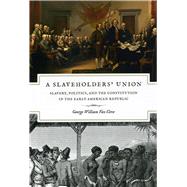A Slaveholders' Union
, by Van Cleve, George William- ISBN: 9780226846682 | 0226846687
- Cover: Hardcover
- Copyright: 10/1/2010
Beginning with its introduction to the first English colonies in North America, slavery in the United States lasted as a legal institution until the passage of the Thirteenth Amendment to the Constitution in 1865. But throughout the contested politics of the early republic, abolitionists cried out that the Constitution itself was a slaveowners' document, produced to protect and further their rights.A Slaveholders' Unionfurthers this unsettling claim by demonstrating once and for all that slavery was indeed an essential part of the foundation of the nascent republic. In this powerful book, George William Van Cleve demonstrates that the Constitution was pro-slavery in its politics, its economics, and its law. Here, he shows that the Constitutional provisions protecting slavery were much more than mere "political" compromisesthey were integral to the principles of the new nation. By the late 1780s, a majority of Americans wanted to create a strong federal republic that would be capable of expanding into a continental empire. In order for America to become an empire on such a scale, Van Cleve argues, the Southern states had to be willing partners in the endeavor, and the cost of their allegiance was the deliberate long-term protection of slavery by American leaders as the nation expanded through the time of the Missouri Controversy. Reconsidering the role played by the gradual abolition of slavery in the North, Van Cleve shows that abolition there was much less progressive in its originsand had much less influence on slavery's expansionthan previously thought, occurring only where it would not cause significant political, economic, or social disruption for white taxpayers.







